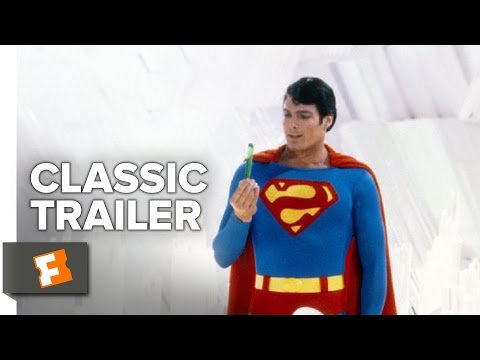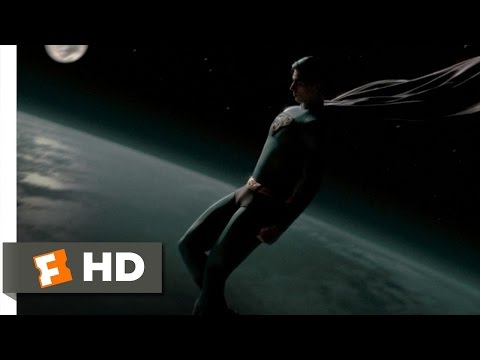I was four years old, and I had wanted to go to the movies my whole life (well, it was probably only a year or two, but it felt like a really long time).
My older brother and sister could go to the movies, but I couldn’t. I was too young. Sure, they could see “Jaws” and “Star Wars” and all the good stuff, but I couldn’t.
So, suffice it to say I was thrilled when my older brother, who would have been about 18 at the time, said I could go and see “Superman” with him.
It was in the days of single-screen movie houses (the town where I now live still has one that’s 101 years old, and it’s a gem). I remember the movie poster hanging in a glass case outside the theater (I had always been, since I can remember, a fan of movie poster art. And if I had the money, I’d blow it on collecting authentic movie posters.)
I remember the fancy lobby interior, my brother telling me to smack his hand if he dips into the popcorn before the movie starts, hearing a lot of shushing from behind me as I didn’t know the etiquette of movie-going yet.
The film starts by bringing us back in time––the movie screen curtains opened in front of you as a boy started reading the Superman story from Action Comics. And then, as if you’ve just entered into it, the comic book comes to life.
RELATED: POP CONFESSIONS – SUPERMAN VS FILM CRITICS
As we journey to Krypton, and even though I couldn’t read yet, the names on the screen blasted straight out at us and from behind. Accompanying our journey through space was John Williams’ terrific score, which I’m listening to as I write (and just purchased an original vinyl copy).
All-in-all, the whole experience was magical. And that is what movies are supposed to be, a magical experience for any age–especially when it comes to superheroes. It’s why I have found myself disappointed with the retelling of Superman since then.
As a storyteller, my aim is to bring stories to life in that same way. Of course, there are those things in movies that grab the senses–like the sound and special effects and costuming that you can’t quite experience in the realm of the written word.
Then again, there are things in the written word that you can’t experience in a movie–which is why the books are often better.
Watching the opening titles of SUPERMAN (1978). I wish you could understand what the experience that was in a theater with the John Williams score. (His best, I think.) But we were lucky. We had STAR WARS, CLOSE ENCOUNTERS, SUPERMAN, EMPIRE, RAIDERS….. pic.twitter.com/PNsS6vCNWv
— James Oliphant (@jamesoliphant) October 15, 2022
Superman was America’s first real mythic hero. His story is ironically reflective of the Christmas narrative, and one wonders if it was done on purpose. Kal-El is sent from the heavens by his father to earth as a baby, was brought up by earthly parents, lived a humble life among the people, and then as a thirty-or-so man heard his calling and went out to save the world.
Having “The Hero’s Journey” become a standard collegiate study, the Superman narrative seems to have gotten a bit mature over the years–and taking itself too seriously, also embracing the Christ figure too much.
For example, Zach Snyder’s “Man of Steel” is fraught with all sorts of Christ-symbolism––Kal-El contemplating saving the earth in front of a stained glass window of Christ at Gethsemane, rising from the dead, and hovering over the earth in a cross-like manner.
While I don’t mind the comparison in a subtle manner, I suppose doing so in such an obvious way allows one to sort of subconsciously further the argument that the Christ story is just a myth.
But I digress (Or do I?)
For Superman, the point is to give kids of all ages a hero that stretches the imagination, that gives us a sense of wonder, awe and adventure while teaching us goodness, kindness, truth, justice and The American Way (boy, that’s not very PC, is it?).
It gives children an example to follow–and perhaps another reason why the Christ-symbolism could be more than a coincidence, but also why the modern approach has been bland.
In the Reeve films, one would leave the theater having felt good. And if you weren’t a child, you’d have left the theater having felt like a child again. But that’s not the feeling one gets when leaving a Snyder film.
We leave a Superman film feeling depressed now. Not what we came in for, is it?
Hollywood has made Superman into a conflicted hero instead of a character of character, which results in nothing to teach children. It’s not fun. It’s just about fighting a bad guy and Kal-El’s own inner struggles of how and why he should continue to be that hero, and his temptation sometimes to just quit.
In fact, in 2006’s “Superman Returns,” our hero did just that––left earth for a while to find the remnants of Krypton, only to find that the earth (and Lois Lane) has more or less moved on without him.
While that’s not all bad, and lends the story some dramatic elements that the Reeve and prior versions did not have, I’d rather have an old-fashioned hero with an old-fashioned, uplifting story and a little more innocence and charm.
And from the responses I’ve heard from others, I think just about everyone else would rather have that, too.
Jeff Miller is a husband, dad, pastor, artist, writer and all-around good guy (for the most part). He lives in the Western Finger Lakes Region of New York State with his wife, Diana. He has three grown children. Jeff has two blogs of his own, A Closer Look and Flashback Friday Christian Music Review. Jeff is also a contributor to Kingdom Winds, where you can read his sermons online.
The post Why Christopher Reeve’s ‘Superman’ Still Matters appeared first on Hollywood in Toto.


